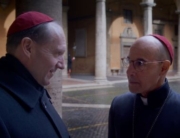Based upon the popular young adult novel by Benjamin Alire Sáenz, writer/director Aitch Alberto’s adaptation is a sensitively drawn coming-of-age tale of friendship and a potential romantic relationship between two Mexican American teens, Aristotle (Max Pelayo) and Dante (Reese Gonzales), in late 1980s El Paso.
Ari (short for Aristotle) is withdrawn, athletic, but not relating to the machismo of his male peers. The film’s tone adopts Ari’s pensive disposition and his slow, thoughtful way of speaking. (Outside of the narrative’s veering into the epistolary, he largely narrates the story). He meets Dante, a more chatty, gregarious, and free-spirited fellow at the town pool, and the two strike up a quick friendship. (“They talk about magic,” Ari intones, “but I never believed in it until Dante.”)
As characters, the two seem somewhat burdened with the grandiose expectations of their heavy, literary names, both trying to figure out their place in the world. Akin to their personalities, Ari’s relationship with his parents, played by Eugenio Derbez (recently in CODA, here, in aged make-up) and Veronica Falcón, is quiet, more discreet. On the other hand, there is a loving openness between Dante and his father (Kevin Alejandro) and mother (Eva Longoria, in an understated, but heartfelt performance). The two boys look at the stars on a telescope one night on a camping sojourn with Dante’s kind parents, and Ari’s eyes are suddenly open to the expansiveness of the universe. Whereas Dante is more assured, it’s a slow burn for Ari’s self-discovery as he figures out his sexuality and grapples with secrets within his family.
This is a sweet tale, if a bit staid, that has already appealed strongly to young teens as a novel. Repression and interiority of a character can be particularly compelling on the page, but with the muted Ari guiding the proceedings along, the film can sometimes feel a bit tepid. It’s enhanced a bit by the soundtrack, which boasts an appealing, catchy cachet of ’80s hits (among them, “Point of No Return,” “Smalltown Boy,” and “La Bamba”), alongside a sunny, acoustic guitar-laden score by Isabella Summers. Bright blues and teals emerge out of Akis Konstantakopoulos’s moody, low-lit cinematography, which is particularly effective at conveying the languidness of the summer heat. The cast is charming, and Alberto’s care and affection for the material comes through. One wonders though, with her graceful visual style and humanist touches, what Alberto could do with more adventurous material down the line.

















Leave A Comment